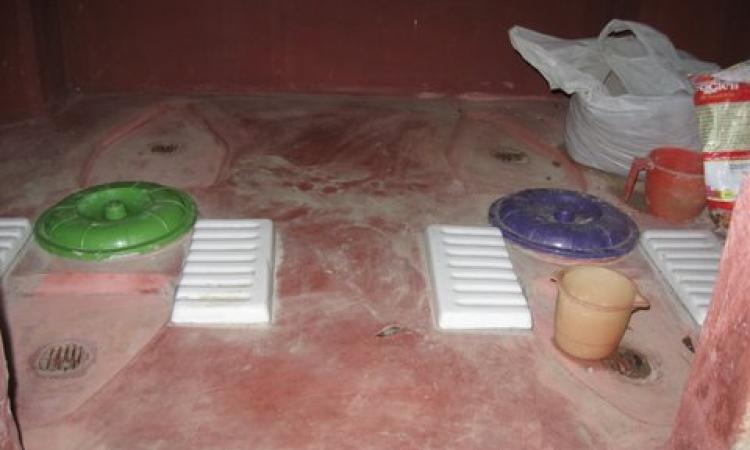
Water is probably the worst medium to treat or transport human refuse. And that is exactly what we use when we flush our poo and pee with buckets full of water. Water only increases the size of the problem - bowl sized refuse gets converted into bucket sizes – and offers absolutely no help to treat the waste. Micro organisms, however, have the capacity to treat faecal matter in a more efficient and environment friendly manner.
How does EcoSan work?
Separating water, urine and faeces forms the basis of Ecological Sanitation or Eco-San.
Instead of the single pan one encounters in a conventional toilet, the EcoSan model has three openings: one for urine, next for faeces and the last one for washing.
While the urine is diverted into a large barrel, diluted and used for agriculture, the faecal matter turns to usable compost within a few months. The wash water is diverted into patch planted with Canna indica where the soil microbes take care of polishing it.
Eco San toilets are constructed on a raised plinth with two pans and two chambers below. When one pan is being used, the other remains closed. The faecal matter falls directly into the chamber below and once the business is done, all that is required is to drop a handful of ash or saw dust over it to help remove moisture content.
Once the chamber fills up, it is closed and the next one is opened for use. By the time the second one fills up, the faecal matter in the first chamber would be reduced by the digestive action of microbes and their enzymes and is completely transformed into usable compost. This process can take anywhere between 6 months and a year depending upon the size of the chamber.
In this model, refuse is in fact a resource. Human waste is treated right where it is generated and also provides additional nutrients for plants nearby.
Community Eco San toilets of Musiri
SCOPE (The Scientific Committee on Problems of the Environment) has been working to popularize EcoSan toilets across the state of Tamil Nadu for many decades now. In collaboration with WASTE, Netherlands, an Eco San Pilot Project was launched to construct community toilets on the banks of the River Cauvery in Musiri Panchayat in Tiruchirapalli district of Tamil Nadu.
Two blocks with seven cubicles each were constructed for the convenience of both men and women in the village.
Get paid to poop
The Gram Panchayat was responsible for the upkeep for the toilets. A user card was issued to villagers who frequented the facility. To encourage usage, villagers were paid 10 paise every time they used the toilets and the total amount was given to them at the end of the month. The reward, however small, helped establish these toilets as a superior alternative to defecating in the open.
Building these toilets was more an exercise in societal dynamics than one just in sanitation. Out of the 1200 people residing in the village, almost 350 individuals with no access to individual toilets regularly use this community facility. Scavengers involved in keeping the surroundings clean now have access to toilets that clean themselves.